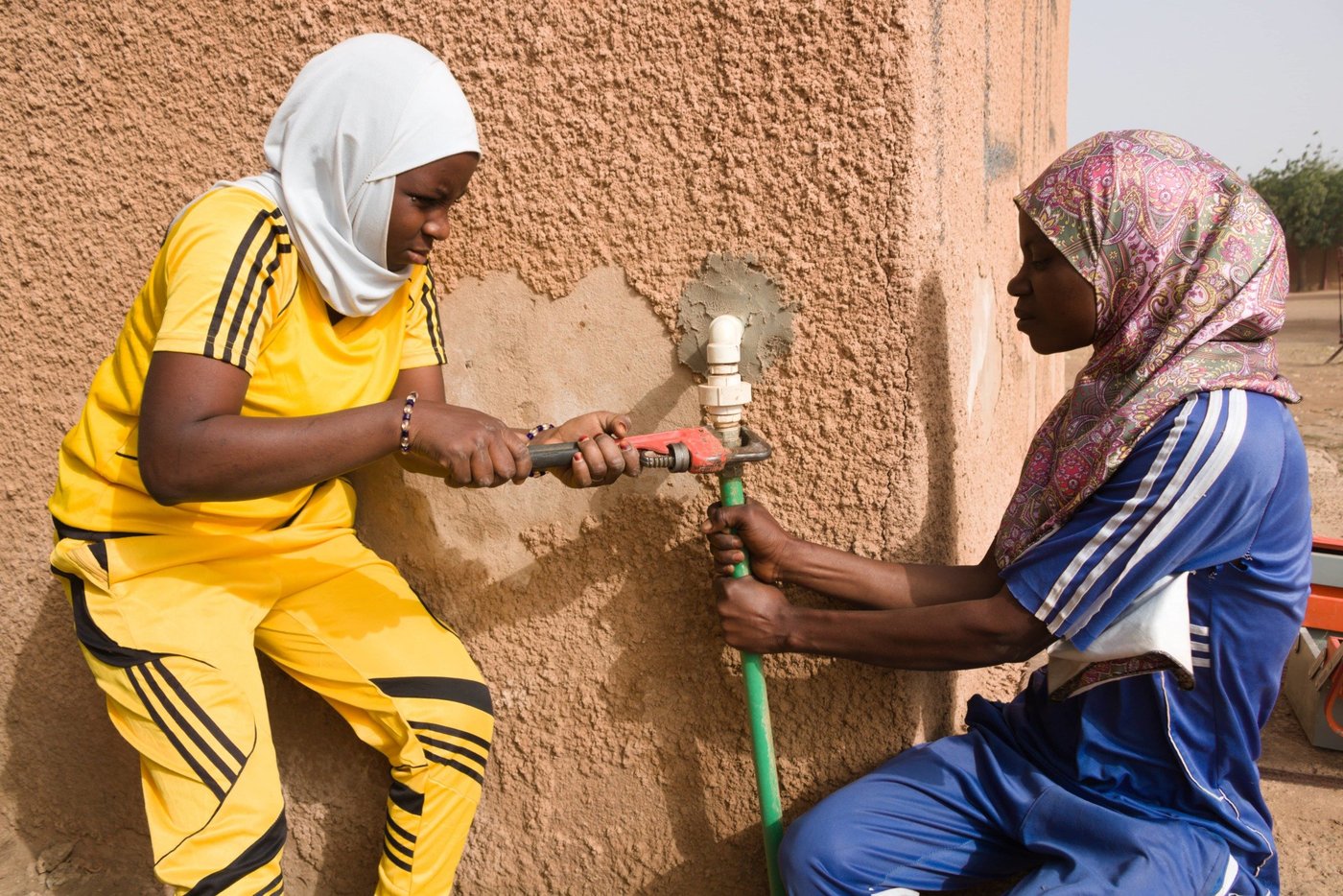The pumps for the school’s toilets have been broken for several weeks, and Maimouna and Salamatou were called to the rescue the day before by the school headmaster. Within a few hours, and with many turns of the crank, they managed to get the water point working again.
Maimouna and Samalatou are plumbers, two of the few Nigerien women who work in this traditionally male-dominated profession. And they do not hide their pride.
“Today, thanks to plumbing, I have become a role model in my family,” explains Salamatou, 19. “I am able to provide for not only myself, but I can also buy food for my five brothers and my parents.”
Three years ago, however, they were the only ones who believed in their dream of becoming plumbers. Their career choice had been greeted with a good deal of scepticism by their respective families.
“When I learned that the Norwegian Refugee Council (NRC) was offering young people the opportunity to learn a trade at the vocational training centre, I enrolled in the plumbing course”, recalls Maimouna, 21.
She explains that this surprising choice was originally strategic: there was no expert plumber in her community, so she naturally chose a trade that would help solve everyday problems in her village.
“At first, my parents didn’t understand. They suggested that I choose a profession that was not reserved for men. I was adamant in my choice. In the end, they supported me. I fell in love with plumbing the moment I started – and I still love it,” says Salamatou with a big smile.

Dropped out of formal school
Maimouna and Salamatou come from Daykaina, a village in the Tillabéri region. They both dropped out of school at the age of 15.
“I didn’t want to drop out of school, but I repeated years four and five several times, so I was expelled from public school,” says Maimouna. “My parents didn’t have the financial means to enrol me in a school. So I stayed at home for two years, helping my mother with the household chores.
Academic difficulties also led Salamatou to throw in the towel: “I took the ordinary level exams three times without success and I gave up. Formal school was not meant for me.”

Learning opportunities
NRC started its interventions in the Tillabéri region in 2020 to respond to the accelerating humanitarian crisis in the cross-border region of Liptako Gourma. In 2021, more than half of the civilians killed in Niger were in Tillabéri, and the displaced population there has quadrupled since 2018, numbering 153,455 internally displaced people in 2023.
NRC’s first action in the region was the expansion of the vocational training centre with the creation of new learning spaces. Our focus was also on reinforcing the electrical network in order to offer more theoretical and practical training in manual trades for the youth of Tillabéri. As part of its vocational training programme, through functional literacy, entrepreneurship and leadership courses, NRC assisted nearly 200 young people from Tillabéri between the ages of 15 and 24, including Maimouna and Salamatou.
After two years of training, they embarked on their new career with obvious success. Today, these young women are not only experienced plumbers capable of building and repairing water points, but they are also passionate about their work, making a good living at the same time.
“NRC has given me a second chance to live my life in dignity thanks to this training,” says Salamatou.

Creation of a business
“After our training, we decided to form a group to work together and offer better services,” explains Maimouna. “We named our small business Wafakaye which means ‘understanding’ in the Zarma language.”
Together with another friend who has also benefited from vocational training, the young women manage their work in solidarity, allowing them to increase their capacity and pool their savings for new projects.
“We have a savings account for our income. Each of us contributes half of what we earn to our savings account, and we share the other half equally to meet our own needs.”
The three partners have been able to save almost 100,000 CFA francs so far, roughly three months of salary at minimum wage in Niger.
“When we have a contract, we meet to discuss the price and terms of the work,” explains Salamatou. “We divide the tasks to meet our clients’ needs as efficiently as possible,” she adds.
The three young women hope to open a workshop soon and to inspire other young women in the community to consider non-traditional jobs like plumbing. They know that the example of their success is the best way to fight against prejudice and pave the way for others. Salamatou hopes to be even more proactive to achieve that goal.
“I would like to become a plumbing teacher at the vocational training centre,” she says.


